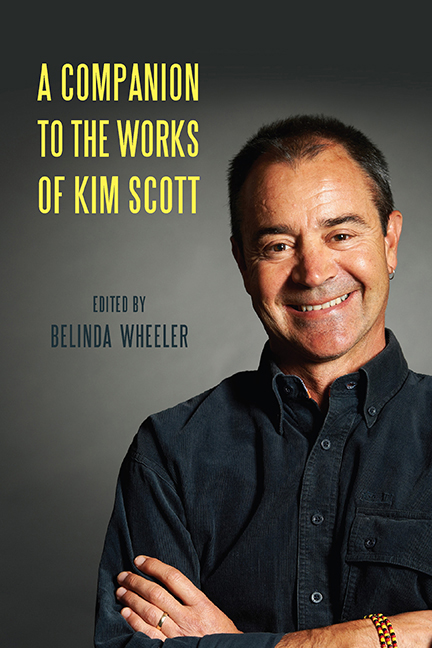Book contents
- Frontmatter
- Contents
- Foreword
- Acknowledgments
- Note on Orthography
- Chronology of Key Writings
- Introduction
- 1 Kim Scott’s Publishing History in Three Contexts: Australian Aboriginal, National, and International
- 2 Kim Scott’s True Country as Aboriginal Bildungsroman
- 3 The Land Holds All Things: Kim Scott’s Benang—A Guide to Postcolonial Spatiality
- 4 Kim Scott’s Kayang and Me: Noongar Identity and Evidence of Connection to Country
- 5 “Wreck/Con/Silly/Nation”: Mimicry, Strategic Essentialism, and the “Friendly Frontier” in Kim Scott’s That Deadman Dance
- 6 The International Reception of Kim Scott’s Works: A Case Study Featuring Benang
- 7 Traumatic Landscapes: Inscribing Spectrality and Identity in Kim Scott’s “A Refreshing Sleep,” “Capture,” and “An Intimate Act”
- 8 Spatial Poetics and the Uses of Ekphrasis in Kim Scott’s “Into the Light” and Other Stories
- 9 The Poetry of Kim Scott
- 10 The Wirlomin Project and Kim Scott: Empowering Regional Narratives in a Globalized World of Literature
- 11 Kim Scott as Boundary Rider: Exploring Possibilities and New Frontiers in Aboriginal Health
- 12 An Interview with Kim Scott
- Notes on the Contributors
- Index
5 - “Wreck/Con/Silly/Nation”: Mimicry, Strategic Essentialism, and the “Friendly Frontier” in Kim Scott’s That Deadman Dance
Published online by Cambridge University Press: 08 May 2021
- Frontmatter
- Contents
- Foreword
- Acknowledgments
- Note on Orthography
- Chronology of Key Writings
- Introduction
- 1 Kim Scott’s Publishing History in Three Contexts: Australian Aboriginal, National, and International
- 2 Kim Scott’s True Country as Aboriginal Bildungsroman
- 3 The Land Holds All Things: Kim Scott’s Benang—A Guide to Postcolonial Spatiality
- 4 Kim Scott’s Kayang and Me: Noongar Identity and Evidence of Connection to Country
- 5 “Wreck/Con/Silly/Nation”: Mimicry, Strategic Essentialism, and the “Friendly Frontier” in Kim Scott’s That Deadman Dance
- 6 The International Reception of Kim Scott’s Works: A Case Study Featuring Benang
- 7 Traumatic Landscapes: Inscribing Spectrality and Identity in Kim Scott’s “A Refreshing Sleep,” “Capture,” and “An Intimate Act”
- 8 Spatial Poetics and the Uses of Ekphrasis in Kim Scott’s “Into the Light” and Other Stories
- 9 The Poetry of Kim Scott
- 10 The Wirlomin Project and Kim Scott: Empowering Regional Narratives in a Globalized World of Literature
- 11 Kim Scott as Boundary Rider: Exploring Possibilities and New Frontiers in Aboriginal Health
- 12 An Interview with Kim Scott
- Notes on the Contributors
- Index
Summary
After our experience of the native interrogation it is difficult to agree entirely with Fanon that the psychic choice is to “turn white or disappear.” There is a more ambivalent, third choice: camouflage, mimicry, black skins/white masks.
—Homi Bhabha, The Location of Culture, 120What I mean by ethical belonging partially entails a reclaiming and rearticulation of subordinate and subaltern humanity as a site of strategic universalism… . Such strategic universalism as espoused by subaltern artists must in fact be read as a form of resistance, which is a refusal to see the world only from the place of subordination or victimhood.
—Rinaldo Walcott, “Against Institution,” 22KIM SCOTT's That Deadman Dance (2010), by the authors’ own admission at the end of the novel, is a part-fictional, part-historical account of relations between the whites and the Noongar people during the early settlement era (the first decades of the nineteenth century) in Albany, Western Australia. The relationship, as stated in the novel, began on a note of friendship, camaraderie, and naïve, open acceptance. But, such an approving companionship eroded owing to the colonizer's racist bigotry, assimilationist tendencies, and capitalist exploitations. Further instrumental in creating an irreparable rift in the relationship were the greed that sprang from the ideologies of making a modern white nation and the repressive state authorities who institutionalized coercive methods to control “native problems” (a phrase habitually used by white colonizers of Australia to refer to the unwanted Aboriginal presence in the expansion of frontier settlement). The novel is also about the struggle of the Noongars, who from the beginning try to hold tight to their culture and ethnicity while sampling Western ways. The Noongars in the novel take recourse to and adopt appropriative methods when the gross, violent program of promoting the white nation-state slowly marginalizes them; as a result, the Noongar bulwark their identity against the white outsiders. Scott documents the Noongars’ desperate efforts to survive culturally and maintain an ethnic identity and ethnic nation within the foundation period of a white modern nation.
- Type
- Chapter
- Information
- A Companion to the Works of Kim Scott , pp. 61 - 73Publisher: Boydell & BrewerPrint publication year: 2016

